- Home
- Lauren Willig
The English Wife: A Novel Page 8
The English Wife: A Novel Read online
Page 8
“Yes?” Mr. Burke’s hand still held hers.
Quickly, Janie said, “What was the reward? The one I was meant to come to claim.”
Mr. Burke released her hand, taking a step back. “Et tu, Brute? You put honesty to the test quickly enough.”
The sun had gone back behind the cloud, and the sky was gray and cold, heavy with the threat of snow.
“It wasn’t meant as a test.” Katie had been a test. This was just a question. “I assume I could discover the answer myself by purchasing a paper.”
Mr. Burke gave a curt nod. “The World is offering $500 to anyone who can find Annabelle Van Duyvil’s body.”
There was something rather chilling about the image, the woman she had known, reduced to a commodity, sought after by bounty hunters. “Why didn’t you say so?”
Mr. Burke cast her an ironical look. “I suppose I was trying to spare your blushes.”
Janie had had enough of being spared. “Don’t.” In her most businesslike voice, she said, “I work at the Girls’ Club on Frankfort Street Tuesday and Thursday mornings. You may send a message to me there if you have any news.”
“Not to the house?”
Honesty for honesty. Janie lifted her eyes to meet his mocking gaze. “My mother and cousin know nothing of this. I would prefer—”
“—to keep them in ignorance?” Mr. Burke appeared to be more amused than appalled. “What other secrets are you keeping, Miss Van Duyvil?”
“None that would be of any interest to you,” said Janie. “Good day, Mr. Burke. I will look for your note at Frankfort Street.”
As Janie hurried away in the gathering dusk, she could see them standing there still: Mr. Burke and Nathan Hale, both staring after her.
FIVE
London, 1894
April
The American came to the stage door the next night and the next after that.
“Don’t tell me you’re not sick of us!” Georgie said, but there was no hiding the fact that she was pleased to see him.
“I’ve never seen Twelfth Night performed quite this way before,” said Mr. Van Duyvil, keeping an admirably serious countenance.
“And never will again, if you’re lucky.” She’d meant it jokingly, but it was beginning to feel prophetic. They were well into April now, a time when patrons ought to have been thronging the seats, but they were playing to a largely empty house.
Even more worryingly, Mr. Dunstan had made no noises about the next production. Usually, Georgie dreaded the period between shows, weeks to manage on her meager savings. They were only paid for performances, not for rehearsals. But rehearsals meant pay to come. The rumor among the cast was that Mr. Dunstan intended to sell the theater, that the show was only dragging on pending negotiations.
“So you’ve made your plans,” Kitty said when she saw Mr. Van Duyvil at the theater again and again.
It wasn’t like that, but Georgie knew Kitty wouldn’t believe her that their relationship consisted of nothing more than food and conversation. If she weren’t so afraid of using the word, she might even call it friendship.
At first, Georgie had been punctilious in accepting nothing, not even the cost of her port and lemon or a slice of meat pie. She’d had admirers before—if admirers they could be called—men who tried to follow her home, men who didn’t take kindly to no as an answer. She’d learned quickly that some men believed the price of a meal entitled them to more.
But Mr. Van Duyvil remained as correct in his behavior as though Georgie had been Miss Lacey of Lacey Abbey rather than Georgie Evans of the Ali Baba. Being with him, even in the rude environs of the Feathers, Georgie felt the veneer of the past three years melting away, felt as though she were a girl fresh out of the schoolroom again, proud of her company manners.
Which was ridiculous, of course. But it was pleasant to share a meal, to talk to someone who liked the same things she did—or the same things she had, a lifetime ago.
Bit by bit, she had relaxed her own rules, and when Mr. Van Duyvil put coins on the table to pay for her meal, she didn’t push them back at him. A meal at the Criterion may have excited expectations, but meat pie at the Feathers had an odd sort of safety to it.
It was the same with the gifts Mr. Van Duyvil brought her. They were never the sort that could cause offense or rouse expectations. Kitty had wrinkled her nose at the basket of oranges, fresh from the docks, but Georgie had felt a strange constriction in her chest at the sensation of the wrinkled rind against her fingers, the sharp scent of citrus as her nails dug into the flesh.
There had always been an orange buried deep in the toe of her Christmas stocking. The colonel had made a game of it, taking out the atlas from the library, charting the paths the fruit might have traveled.
“They smell like childhood to me,” Mr. Van Duyvil confided as Georgie buried her head over the fruit, breathing in that half-forgotten scent. “My father wasn’t well, so when it was particularly miserable in New York, we would take the train all the way down to Florida, straight into the sunshine. Nothing ever tasted so good as that first orange right off the tree.”
“He couldn’t have brought you roses?” said Kitty, but Georgie had slept with an orange beneath her pillow that night and woken with tears on her cheeks.
The next week, it was a slim volume of poetry: Edgar Allan Poe. “Don’t tell me you’ve never read ‘Annabel Lee.’ It is,” he added, his eyes meeting hers over the red morocco cover, “about an Annabelle lost.”
Georgie’s fingers fumbled with the book, flipping it open to the first page, using it as a shield. It had his name on the flyleaf, Bayard Van Duyvil, with a coat of arms comprised of a rising sun, three acorns, two annoyed squirrels, and the motto Omnibus Effulgemus.
“What’s this, then?” she demanded. “I can sing for you in Italian if you like, but Latin is Greek to me.”
“We shine for all,” Mr. Van Duyvil translated. He looked at her thoughtfully but, to Georgie’s relief, dropped the topic of Annabelle. His finger traced the rays of the sun, one by one. “It was a rather feudal situation in New York up until a few generations ago.”
“It’s not anymore?” They were at their usual table at the Feathers, where Mr. Van Duyvil was now tacitly recognized as belonging to Georgie. Georgie might have corrected them, but it saved Mr. Van Duyvil being bothered by the attentions of Long Mary or Leaky Sue, which, she assured herself, would have embarrassed him considerably.
“Not the same way—a fact my mother regrets bitterly. She’s constantly trying to stop the incursions of the new people.” Mr. Van Duyvil thought about it for a moment, idly running his finger over the shape of the shield. “I don’t believe she would have liked the old order, though. My father’s parents lived almost entirely in their house in the country, among the tenants they thought of as their people. When I was a child, there were a few elderly farmers who still spoke Dutch, or a version of it. They would feed me doughnuts and fried apples.”
It had been crumbly cheese and flat gingerbread biscuits for Miss Annabelle when she’d ridden out on her pony, or sometimes a salty bite of stuffed chine or pork loaf, rural delicacies that weren’t to be found in the abbey, where the cook had pretensions of gentility.
Georgie resolutely pushed away the memory. “Who has it now? The house, I mean.”
“I do.” When she looked at him in surprise, Mr. Van Duyvil amended, “The house is still there, but we never spent more than a few days at a time there. I don’t think I’ve been back more than once since my father died.”
“But why? If it’s yours, why not go back?”
Mr. Van Duyvil made a resigned gesture. “Newport has always been more to Mother’s taste. She lives to show her jewels and snub the new people.”
“Your mother, perhaps, but what about you?” Georgie cocked her chin. “Does she know her son likes to mingle with low company? Or is that just the prerogative of a gentleman?”
Mr. Van Duyvil interested himself in his toad-in-the-hole. “Sh
e knows I’m stopping awhile with friends in London.”
Friends. She supposed they might be called that. But it didn’t really answer the question. “Why don’t you want to go home?”
Their intimacy only went so far, apparently. Mr. Van Duyvil narrowed his eyes at her. “Why don’t you?”
Georgie picked up her port and lemon, inhaling the familiar acrid scent. “What, you don’t think it’s my love of the stage that keeps me at the Ali Baba?”
Mr. Van Duyvil cast her a skeptical look. “Is this the same woman who told me last week that she’s sick of the smell of greasepaint?”
Hoist by her own petard. “You listen too well,” grumbled Georgie. “What makes you think I have a home to go to? Most of the girls here don’t.”
She’d encountered all manner of stories since she’d arrived in London, stories that made her own troubles seem small and petty in comparison: brutal stepfathers, starving siblings, mothers out of their minds on gin. There were girls like her, too, who had run off for adventure’s sake or because they had a yen for the stage. But her acquaintance in London had opened Georgie’s eyes to real want, the sort of want she had never imagined in the security of a rural town.
“Because you’re not like the other girls.” Something about the way he said it, about the way he looked at her, made Georgie feel like the lost princess out of a novel, Sarah Crewe and Little Lord Fauntleroy rolled into one. “What about your colonel? The one who raised you?”
Mr. Van Duyvil remembered altogether too much of what she’d told him. Or maybe it was her own fault for succumbing to the temptation of confiding in someone with whom she didn’t have to play a role, didn’t have to be on guard.
“The colonel died.” So quickly, without warning. He’d gone out for a day’s hunting and come home in the back of a wagon, his neck broken going over a fence he’d jumped a thousand times before. “When … when the colonel died, a cousin inherited the abbey.”
“Not Annabelle?” Mr. Van Duyvil’s voice was gentle, unobtrusive.
Georgie ran a finger over the jagged edges of the cut pages of the book, feeling the bite of the paper against her skin. She welcomed the pain; it brought her back to herself, grounded her. “Annabelle had her portion, but the house was entailed.”
Such generosity, everyone had agreed, Mr. Lacey letting his bereaved cousin stay on in her childhood home. Chaperoned, of course, by her companion, Miss Smith. As if the presence of an extra woman in the household was an assurance of propriety.
“Was that why you left?”
Georgie pressed her lips tightly together. “Let’s just say that you have a home to go back to. I don’t.”
“There are homes and homes.” Mr. Van Duyvil traced the rim of his cup with a finger. “My mother has an idea of the man she wants me to be. I’m to marry a Van Rensselaer or a Livingston, occupy the family box at the Opera, and begin work on a suitable cottage at Newport. In time, I’ll have a son who’ll do the same. And so it goes.”
“What’s so dreadful about that?” Feeling churlish, Georgie lightened her tone. “I’ve not met any Van What’s-Its or Livingstons, so I defer to your judgment in the matter.”
“The system has its benefits, I suppose. Money. Security.” Mr. Van Duyvil moved restlessly in his seat, making an abortive gesture with one hand. “One finds one’s escape where one can. My father collected early editions of plays and poetry. It was an eccentricity that could be tolerated, provided he confined his spoils to a glass case in an appropriate room and never allowed it to interfere with the performance of his social obligations.”
Georgie was taken aback by the edge of bitterness in his voice. “What’s your indulgence, then?”
Mr. Van Duyvil paused a moment, thinking. His eyes lifted to her face. Slowly, he said, “Would you believe me if I said you?”
Exhilaration warred with alarm. They were friends; she’d no desire for him to make love to her. Why, then, were her hands tingling, her cheeks burning?
Georgie gripped her hands together in her lap. “I don’t believe I would enjoy being confined to a glass case in an appropriate room. It seems rather limiting.”
Mr. Van Duyvil cast her a long, considering look. “You’ve already broken out of one, haven’t you?” Before she could answer, he said, “If you’re not averse … I have a proposition for you.”
Disappointment came crashing down on her. She ought to have known it would happen sooner or later. It was just that it was later that made it harder. She might have snubbed him with impunity a month ago, but she’d grown accustomed to his face, his company. “What sort of proposition?”
“Would you come to a play with me?” When she didn’t answer, Mr. Van Duyvil said, with a fine air of self-deprecation, “I know it’s a bit of a busman’s holiday for you, but I’ve been wanting to see Lady Windermere’s Fan, and I don’t like to go alone.”
London, 1894
May
They saw Lady Windermere’s Fan and Arms and the Man, Georgie’s only requirement being that there be no song and dance.
Georgie felt decidedly odd on the other side of the looking glass, sitting in the audience, dressed in her best, on the arm of a man in evening attire. There were no impediments, now, to her accompanying Mr. Van Duyvil to the theater in the evening or for a walk in the park in the afternoon; Eleven and One Nights had closed, had closed with no promise of a sequel. The doors of the Ali Baba were locked and barred. After three weeks, the building already had a look of abandonment about it. The rumor was that it was to be razed, the leasehold sold for a block of flats.
In Hyde Park, the trees were brilliant with new leaves, and the grass along the Serpentine was dotted with daisies. Coats were unbuttoned; heavy wools abandoned for lighter fabrics. Children raced ahead of their nannies, rolling hoops and chasing balls, tossing wads of bread to the ducks, who raised their bills from the water. The world had been reborn, and everyone was frolicking.
Except for Georgie, who felt as though she had brought winter’s pall with her, wrapped around her like a cloak.
“Did the audition go well?” Mr. Van Duyvil bent his head to hers as they walked through the arch at Hyde Park Corner, navigating their way through other pedestrians and the steady stream of equestrians bound for Rotten Row.
Georgie ducked her head, letting the brim of her unfashionable hat shield her face. “The less said about it, the better.”
“That bad?”
To their left, a wild-haired man in a dirty cravat harangued a largely uninterested audience. He might be roaring about anything: workers’ rights, the price of coal, the oncoming apocalypse. But it was spring, and no one was disposed to feel indignant, not with the breeze bringing the scent of new grass and the sun warm on their shoulders.
Georgie blinked back sudden tears. “Worse,” she said gruffly. And it had been worse, so much worse. She’d worn some scanty costumes in her time, yes, but she’d not yet been reduced to dancing in her shimmy.
Yet.
Mr. Van Duyvil gently squeezed her elbow. “Something will come along.”
Georgie nodded, but couldn’t quite trust herself to speak. Nothing had come along. The burlesques were closing, one by one, replaced by musical comedies featuring a different class of actress, with more emphasis on the singing and less on the legs. Her voice might be good enough for the Ali Baba, but it wouldn’t fly at the Gaiety.
She’d thought she couldn’t sink lower, but it seemed that there was nowhere to go but down.
“I’ve been thinking of a change of profession,” she managed as they strolled with the rest of humanity onto the footpath that ran between the Serpentine and the Row. “There’s an opening at the ribbon counter at Liberty’s.”
“You would work as a shopgirl?”
“Is it any more shameful than showing my legs for money?” The words came out more sharply than Georgie had intended. She tried to soften her tone. “I thought Americans were all for industry and hard work. You’ve a profession, after al
l.”
“If I ever practice it.” Mr. Van Duyvil bent to retrieve a fallen doll, handing it back to the small child with a bow and a smile. Straightening, he grimaced at Georgie. “We’ll see how much longer I can contrive to escape it.”
Georgie felt a heaviness in her chest. “Do you return to New York soon?”
“Sooner than I would like.” Mr. Van Duyvil scuffed a well-polished shoe against the dirt of the path. “My mother writes me that my sister is all but engaged.”
“Felicitations,” said Georgie, her voice unnatural to her ears. “When may the happy union be expected?”
“Soon. As to the happiness of it…” Mr. Van Duyvil shrugged his shoulders.
Beneath his tall hat, his hair gleamed golden in the spring sunlight. Georgie felt herself memorizing him, the way the light and shadow played across his clean-shaven face, the way he moved, the way he walked, all the little details that made him so peculiarly himself and, over the last two months, inexplicably dear. She could feel herself pressing the details into memory, saving them like dried flowers kept in a spinster’s chest, relics of a past that might have been, of a future that never was.
“Do you not approve your sister’s choice, then?” She tried to keep her voice light, her tone neutral.
Mr. Van Duyvil’s sister should be nothing to her, her marriage none of Georgie’s concern. Because Georgie was nothing to Mr. Van Duyvil, she knew that, had always known that their time was limited, that his real life would, inevitably, close back around him.
She could feel it happening already, in the influx of wealthy Americans to London for the Season, in the evenings that she dined alone at the Feathers because Mr. Van Duyvil was, as he put it, doing his duty by his mother’s friends.
“I know Teddy Newland a little.” Mr. Van Duyvil paused by the railing that separated the equestrians from the pedestrians. “He’s exactly what my mother had hoped for—standing, breeding, money.”
“And your sister? What does she hope for?”
“My sister?”

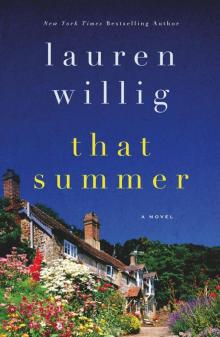 That Summer
That Summer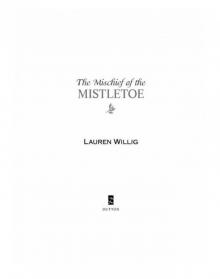 The Mischief of the Mistletoe
The Mischief of the Mistletoe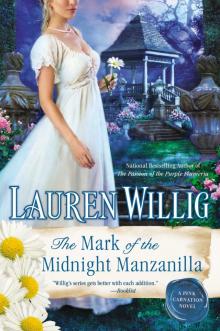 The Mark of the Midnight Manzanilla
The Mark of the Midnight Manzanilla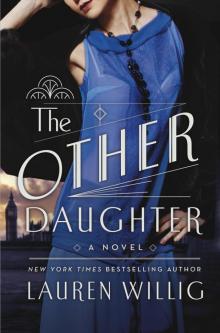 The Other Daughter
The Other Daughter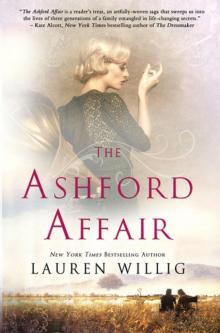 The Ashford Affair
The Ashford Affair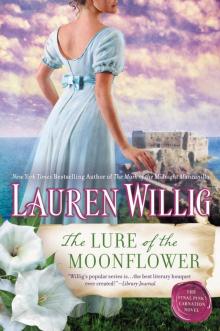 The Lure of the Moonflower
The Lure of the Moonflower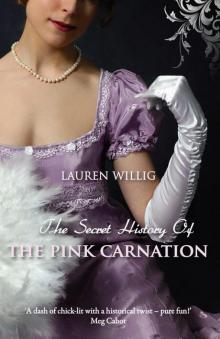 The Secret History of the Pink Carnation
The Secret History of the Pink Carnation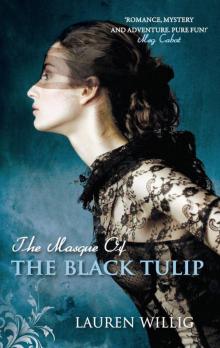 The Masque of the Black Tulip
The Masque of the Black Tulip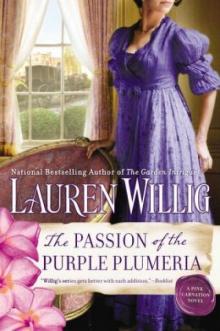 The Passion of the Purple Plumeria
The Passion of the Purple Plumeria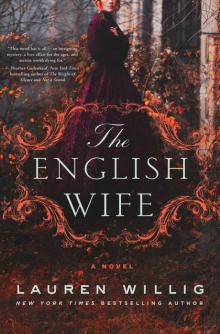 The English Wife
The English Wife The Garden Intrigue
The Garden Intrigue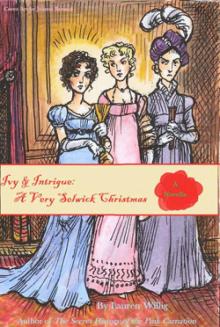 Ivy and Intrigue: A Very Selwick Christmas
Ivy and Intrigue: A Very Selwick Christmas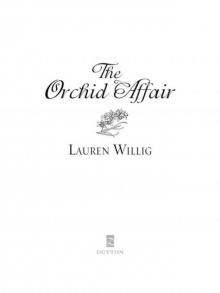 The Orchid Affair
The Orchid Affair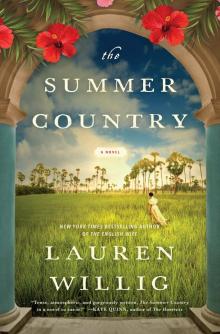 The Summer Country
The Summer Country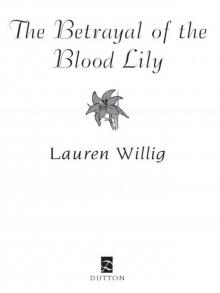 The Betrayal of the Blood Lily
The Betrayal of the Blood Lily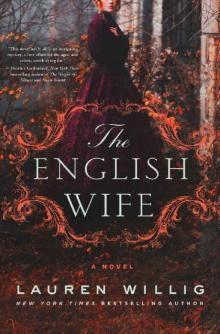 The English Wife: A Novel
The English Wife: A Novel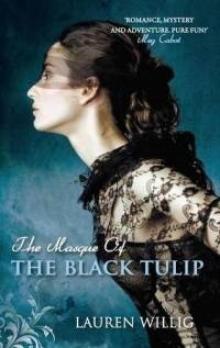 Masque of the Black Tulip pc-2
Masque of the Black Tulip pc-2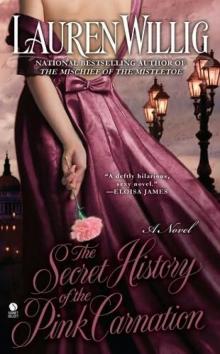 The Secret History of the Pink Carnation pc-1
The Secret History of the Pink Carnation pc-1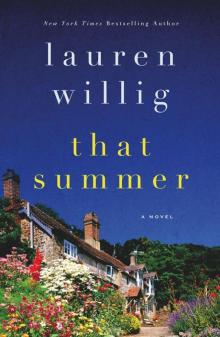 That Summer: A Novel
That Summer: A Novel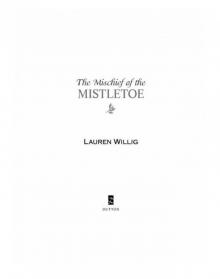 The Mischief of the Mistletoe: A Pink Carnation Christmas
The Mischief of the Mistletoe: A Pink Carnation Christmas